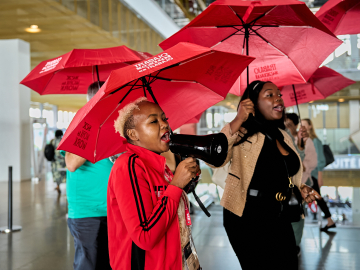Reproductive Justice Centers on Respect
“No providers come into this work for purpose of abusing women.”
That statement, from Lynn Freedman at a #CUGH20-18 panel on reducing disparities in maternal health care, resonated deeply with the audience, which included people around the world engaged in improving birth experiences and outcomes for women—nurses, midwives, doctors, and public health advocates. Because even though providers go into the field with the best of intentions, too many women leave the hospital after giving birth and say, “They don’t respect us.”
And, in the US, many of the women suffering the most disrespect and abuse at the hands of providers are women of color.
Disrespect and abuse can include non-dignified care, neglect, physical abuse, non-confidential care, non-consented care, and inappropriate demands for payment. Freedman, a professor of Population and Family Health at Columbia’s Mailman School of Public Health, has a project that is taking a deeper look at what disrespect and abuse means. They are not just listening to women, but too providers as well—driven by the need to understand this as a systems problem that affects providers too. When providers are under pressure, it leads to abuse.
It's an issue that has always simmered below the surface, but gained more attention following the Center for Reproductive Rights Failure to Deliver report, which exposed disrespect and abuse in a Nairobi hospital. But, the problem extends beyond Kenya; it’s a global problem. The report marked a turning point; since then, Freedman said, there has been an explosion of efforts to examine disrespect and abuse during childbirth.
It also represented a shift in the US. The sexual and reproductive justice movement sought to improve understanding of what’s happening to women not just clinically but placed in social, political and historical context. The panel aimed to share ideas on how to generate the data that is needed to illuminate the underlying reasons for the disparities in maternal health care—with panelists sharing best practices such as collecting feedback from patients and post-discharge surveys.
Mary-Ann Etiebet, executive director of Merck for Mothers, mentioned that as a doctor, opportunities to hear back from patients would have made a difference in how she approached her patients.
More suggestions to help advance reproductive justice offered up by panelists and the audience:
- Women with disabilities have also endured substantial discrimination in thi sphere, including forced sterilization … they should be included in data collection efforts as well.
- In many countries, men are key decision makers in where women have their babies; they need to be included in the discussion.
- If you’re a med student: Fight to make sure your school’s curriculum includes efforts to dismantle racism and implicit bias.
What else happened at #CUGH2018? Check out Global Health NOW's conference blog.
Join the tens of thousands of subscribers in more than 100 countries who rely on Global Health NOW summaries and exclusive articles for the latest public health news. Sign up for our free weekday enewsletter, and please share the link with friends and colleagues: http://www.globalhealthnow.org/subscribe.html




